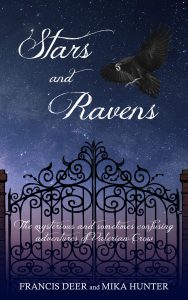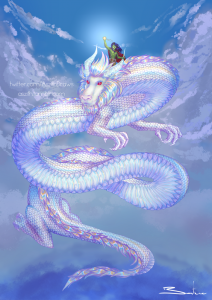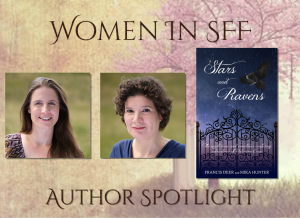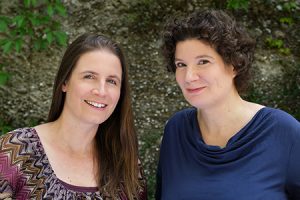Author Spotlight: Francis Deer and Mika Hunter (STARS AND RAVENS)
Photo credit Helga Helleberg
Francis Deer and Mika Hunter have been friends for over 30 years, at one point deciding to join forces and become co-authors. They both live in Munich with their respective families: two husbands, two girls, two boys, two cats and the occasional nest of hornets.
Francis Deer holds diplomas in theology and adult educational science. Currently, she works as a software tester for an IT company. In addition, Francis trained as a baby-wearing consultant and runs her own small business. Over the years, she acted in various theatre groups, always striving for the romance part, yet ultimately ending with the comedy role. Francis is an avid collector of tarot cards as they offer an intriguing mix of beautiful artwork and rich symbolism.
Mika Hunter studied foreign languages in Germany and France. After her exams, she went on to work for a European patent and trademark attorney firm. She spent several years in Sweden, where she helped to run a shop for children’s clothes. Mika leads a fantasy role-playing game, enjoying to surprise her players with intricate plots. She loves writing sonnets and drawing everything from birthday cards to stage backdrops for children’s theatre plays. She enjoys a variety of music, among her favourites Italian opera as well as Finnish rock and heavy metal.
Welcome to the Hive, Mika and Francis. Let’s start with the basics: dazzle us with an elevator pitch! Why should readers check out your work?
Thank you for featuring us in your Author Spotlight. We are delighted to participate!
Our main character, Valerian Crow, is an outsider for many reasons. At the beginning of Stars and Ravens, he gets drawn into a murder mystery that has a far broader scope than it at first appears and will haunt him over the entire series.
He and the other characters are “real people”: three-dimensional with different moral values and beliefs. Layer by layer, we reveal their hidden depths as we put them into challenging situations where they succeed or fail, make wise decisions or foolish ones, learn and change and grow. Their varying perspectives will reveal new facets of the story. We show complex relationships. Friendship and, in the long run, diverse romances receive equal attention.
If you love a combination of gothic horror and sometimes absurd comedy, reading between the lines, putting together hidden clues and delving ever deeper into layers of secrets, our novel might be for you.
Tell us a little something about your writing process – do you have a certain method? Do you find music helps? Give us a glimpse into your world!
We are a writer’s team, so we need to coordinate and merge our ways of working and writing.
So far we have published the first book in the Valerian Crow series which will contain four books in total. We have a rough overview for books 3 and 4 and a detailed outline for book 2. Still, we remain flexible and allow characters to surprise us from time to time.
When circumstances allow, we meet twice a week to build the framework for the upcoming chapters. Since our book is relationship-driven, dialogue has a particular focus, and we tend to start with it.
During the rest of the week, we work on our assigned chapters, swapping them back and forth for feedback and improvement. Like this, we are each other’s corrective and often catch plot holes or wrong developments early on, ultimately making the final revision much shorter.
At times we have varying ideas on how a scene will play out and consider this a special chance: by exchanging our thoughts, we have come up with intriguing compromises. For us, the moment where the whole becomes better than its parts always holds a kind of magic.
On other occasions, we come up with the same choice of words, speaking them out in unison. (A funny side-effect of knowing each other for so many years.)
Sometimes compelling ideas pop into our heads at impractical moments; these we scribble down and later add to our outline. It’s nice to arrive at that point of the story and be greeted not by an empty page but by nuggets of gold.
As anyone with kids will know, life is frequently unpredictable, and the pandemic-related homeschooling of our children on top of all our other responsibilities proved to be a particular challenge. During this period, our mantra has become: “Slow and steady wins the race.” We discovered even writing only for a short time each day ultimately results in one chapter after another.
Concerning music: It sometimes sets the mood for a specific scene but is not essential for our writing process.
Sounds like you work perfectly together!
Speaking of worlds, what inspires your worldbuilding? Do you have a magic system/s? If so, can you tell us a bit about it?
 We originally developed parts of our world for a role-playing game with a group of friends. Since then, this world has become more complex, and we have gained a deeper understanding of its various cultures and religious beliefs.
We originally developed parts of our world for a role-playing game with a group of friends. Since then, this world has become more complex, and we have gained a deeper understanding of its various cultures and religious beliefs.
In general, we build the world around the characters, always asking us: How does your culture shape your personality? How would a specific character react to a setting?
Our inspirations are travelling, observing people, browsing photos and artwork, paying attention to intercultural communication and reading a wide variety of non-fiction.
With respect to magic, we have different kinds.
Valerian Crow has an unusual ability in that he can hear magic, a talent that makes him very attractive for certain employers. Depending on the source of magic, the sounds he perceives will differ: He may hear the orchestra of cicadas, the rustle of scales, or the gusts of wind preceding an approaching thunderstorm.
Magic has not only a price but also limits; some things cannot be undone. Moreover, his magical abilities create many problems for him. In fact, he would be quite happy to get rid of them.
What (or who) are your most significant fantasy influences?
Mika: From a young age, gothic classics like Dracula, The Picture of Dorian Gray, The Strange Case of Dr Jekyll and Mr Hyde, or Frankenstein have drawn me towards the fantastic. Revealing worlds behind the ordinary, they fascinated me with their uncanny atmosphere.
Lord of the Rings impressed me deeply with its rich world and the touching friendship between Frodo and Sam.
I read many books from the Dragonlance series as they gave me the possibility to revisit beloved characters time and again, the scope of the world growing ever wider. They also kindled my interest in role-playing games, motivating me to establish my own group.
In addition, John Irving’s novels had a significant impact on me: Coincidences and little details add up to often tragic accidents, comedy and tragedy are closely interwoven. The characters are memorable with all their flaws and quirks, the spirit of diversity and tolerance permeates his entire work.
Francis: As a child, I stumbled across The Neverending Story by Michael Ende. Hunting through our house for something new to read, I spotted it among my father’s books and singled it out due to its ornately scripted title. Inside, I found to my surprise letters in red and green instead of the usual black. So I began to read, puzzled when the hero, Bastian, found a book looking exactly like the one in my hands: the same beautifully illustrated capital letters, the same two-colour print, the same red binding with two snakes framing the book’s title. I remember experiencing a rush of awe and the absolute certainty I had discovered a magical book: Nothing would stop me from reading it. I devoured the story page after page and when I returned to the world hours later, I felt both wistful and blissfully happy. When I informed my father a mysterious book had appeared inside his study, his reply was far too realistic for my taste: He had bought it for my birthday and for some reason thought his bookshelf was a clever hiding-place …
Since then, I regularly return to The Neverending Story; like all good books, it rewards rereading. Apart from creating a riveting fantastical world, Ende does not shy back from serious topics: An overweight and unathletic boy gets mobbed by his schoolmates; his mother is dead while his father suffers from depression. When he finally dares to step into the story, he makes good as well as bad decisions. The book also approaches philosophical issues: the dark undersides of human imagination, the risk of losing parts of our identity when we reinvent ourselves out of shame, the question of what is our true will, to name just some of the topics. Despite this, the message of The Neverending Story is never nihilistic but hopeful.
Outside the fantasy genre, I’d like to name three other authors whose works have in some way inspired me:
Selma Lagerlöf, who blends the real and the fantastic with great skill, approaches complex moral questions and gives her characters the chance to grow; Stefan Zweig with his intense descriptions of human emotions; Margaret Atwood with her concise observations and sharp wit.
As a self-published author, you have to encompass many roles yourself: what aspect of self-publishing do you find the most difficult? Alternatively, which have you enjoyed the most?
The big challenge is to give each role the appropriate attention. There is the risk of neglecting those tasks with which you feel the least comfortable.
In our case, this is definitely marketing. We find it tricky to bring our work into the limelight, the more so since, in our formative years, we were taught not to push ourselves forward.
On the other hand, self-publishing gives us the freedom to follow our vision for the scope of our tetralogy.
What is your process for choosing a cover for your book? Do you have a clear idea of how you want it to look, or do you give your cover artist full creative license?
Mika: Quite early on, I had a clear idea about the design for our covers and drew some first drafts. The stars and the raven were a given, obviously. Since all our main characters are outsiders in one way or another, thresholds and doors are a recurring motif. So we decided to include that symbol on all covers as well.
Francis: The two of us searched and purchased fitting images and an appealing script, then the creative software expert in my family combined all the parts and designed the final cover.
We see such varying opinions from authors when it comes to the time of editing their books. How have you found the editing process? Enjoyable, stressful or satisfying?
We love the initial phase of editing, finding the best match of words for the respective point of view and polishing our descriptions until they shine. Stressful for us are the final rounds when we try to catch all the tiny mistakes that can so easily slip through. Most of all, we find it hard to decide at which point to stop editing and release the book into the world.
The world shifts, and you find yourself with an extra day on your hands during which you’re not allowed to write. How do you choose to spend the day?
Francis: An extra day! How splendid! I would love to spend it at the waterside, perhaps on a small island in the middle of a lake. In the shade of the trees, I would relax in my hammock and watch the clouds sail across a gentle blue sky while daydreaming. From time to time, I would go for a stroll, enjoying the grass brush against my feet, dive into the cool water for a swim and, once back in my hammock, check out the books on my reading list.
Mika: I imagine a day where my kids are at school. I would love to start on the sofa with Earl Grey Tea and a delicious breakfast while listening to music and reading. As an add-on to the already blissful combination, I would help myself to some chocolate. Then, I would tackle some long-planned projects like creating a photo book. I can also imagine myself drawing a greeting card for a dear one’s approaching birthday. After that, I would go for a long walk through the forest, then take a bath with a super-foamy, rose-scented bubble bath and a book. Once my kids are back at home, we would play or read together. As the perfect conclusion to my extra day, I would go to the cinema or opera.

copyright Aszith on DeviantArt
One of our favourite questions here on the Fantasy Hive: which fantastical creature would you ride into battle and why?
Mika: A flying donkey like Donkey from Shrek. Why? There’s a good chance we could skip the battling part with Donkey’s constant prattle driving the opponents mad and off the battlefield. Should our plan fail, he would call in the cavalry, his fire-breathing dragon mate.
Francis: I pick the luckdragon Falkor from The Neverending Story. (Please picture the graceful dragon described in the novel with its pearlescent pink and white scales, not the fluffy-dog-version from the movie.) Falkor is courageous and offers sage advice. Above all, he is a creature of pure joy and luck. So my hope is that Falkor and I would be so lucky as to find a compromise to reconcile the warring parties.
Falkor is an excellent choice!
Tell us about a book you love. Any hidden gems?
We would like to recommend the Engelsfors trilogy by the Swedish authors Sara B. Elfgren and Mats Strandberg (The Circle, Fire, The Key), a young adult fantasy series about a ragtag group of six teenage girls who find out they are witches and form a circle of “Chosen Ones “.
The series presents convincing teen characters who narrate the story from their individual points of view. The characters not only have to discover the scope of their magic but also need to form a strong bond of friendship and trust.
Can you tell us a little something about your current work(s) in progress?
We are currently writing the second book of the Valerian Crow series, which starts right where the first book ends and whose title will be “Suns and Kingfishers”.
Some big reveals will be rolling in, and the reader will gain more insight into several of the more secretive characters. Among them are some women characters already encountered in the first book who will get their own points of view.
Moreover, we are working on concise outlines for books 3 and 4 in which we will move the plot forward to other regions of our world.
Finally, what is the one thing you hope readers take away from your writing?
Most of all, we hope our readers enjoy the time they spent in our world and get a kick out of the various puzzles and reveals.
We also hope to provide food for thought: How do our perceptions affect the world around us? Can we relate to others when we hide too much of ourselves away? Is there always a clear right or wrong, or can there be situations when there are only different viewpoints?
Thank you so much!
Thank you for your inspiring questions! It’s been our pleasure.
Thank you for joining us today, Francis and Mika. Stars and Ravens is available from:
Amazon.co.uk | Amazon.com


